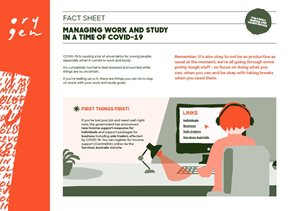Managing work and study in a time of COVID-19

COVID-19 is causing a lot of uncertainty for young people, especially when it comes to work and study. It’s completely normal to feel stressed and worried while things are so uncertain.
If you’re feeling up to it, there are things you can do to stay on-track with your work and study goals.
Remember, it’s also okay to not be as productive as usual at the moment; we’re all going through some pretty tough stuff - so focus on doing what you can, when you can and be okay with taking breaks when you need them.
First things first!
If you’ve lost your job and need cash right now, the government has announced new income support measures for individuals and support packages for business including sole traders affected by COVID-19. You can register for income support (Centrelink) online via the Services Australia website.
Looking for work?
Yes, it’s true, the job market is pretty tough at the moment but there are still jobs out there, especially in industries identified as essential services. Many roles have also been adapted to be delivered in work-from-home settings, such as certain call centre jobs. Keep an eye on the government job sites, employer career pages and the major job search websites such as Seek, Indeed and LinkedIn for new opportunities.
Update your resume and if you’re not sure of how your current skill set fits with other areas of work, you can use the Job Outlook Skills Match function to help figure this out. Remember to include details in your resume that may give you an edge in the current climate, including if you have transport and a driver’s licence; detail your computer and customer service skills and highlight any experience you may have in helping or support roles. Don’t have a resume? Download a sample resume and cover letter here to help get you started.
What about study?
How we study has also changed dramatically with COVID-19. Suddenly we’re using online platforms such as Zoom for lessons and lectures; we might be sharing our study space with pets, flatmates or family members; or we may not have the best internet connectivity at home – or perhaps no internet at all! All this change can be really unsettling and it will take time to get into a new routine.
These are some tips to make this transition a little easier:
- Set-up a dedicated study space that provides some quiet space for you to concentrate or try using headphones if you don’t have a quiet spot available.
- Consider setting up an online study group with your friends or classmates at a set time each week to touch base, share study tips and stay connected.
- Plan out your day! It can be helpful to schedule your study time to keep things ticking over but it can also be helpful to set reminders for breaks, food and to make sure you head outside for some fresh air. If it helps, set an alarm to keep your schedule on track.
- Eliminate distractions where you can - let those around you know if you need 1-2 hours of uninterrupted time if it’s possible. Put your mobile phone in the other room and only use your browser for study-related content.
Changing it up?
Some of you may want to use this time to explore your career options and start to take action to become better prepared for when things return to normal. If you’re up for it, these are some activities that can help build new skills or support you to explore other opportunities that you haven’t had time to do before:
- Massive Open Online Courses (MOOCs) are free introductory courses offered via various education providers throughout the world. If you’ve been curious about other areas of study but not ready to commit to lengthy training, MOOCs are free and a great introduction to a range of study areas.
- Create or update your LinkedIn profile and connect with people and organisations relevant to your areas of interest
- If you already know what you want to do, enrol in an accredited training course. Many are now available online and you can search courses here: https://www.myskills.gov.au/
- Ever wanted to run your own small business? Now can be a great time to start planning and learn what’s really involved.
Where to get help?
eheadspace has a team of work and study specialists offering free online and phone-based career support through the digital work and study program.
Employee Assistance Program
If you are working, check with your employer to see if they have an Employee Assistance Program (EAP) available. EAP is a confidential counselling service offered by employers to their employees to support their wellbeing. Depending on the employer’s arrangement, EAP may also extend to immediate family members and some may offer a specific career counselling service.
Career counselling services
The Career Development Association of Australia (CDAA) has career counsellors based throughout Australia offering web or phone-based appointments. CDAA members can help you manage your career, make occupational and study decisions and plan career transitions in a wide variety of ways. Career counsellors charge a fee for the services they provide so you are encouraged to contact 2-3 members and discuss your needs to make an informed decision about who could best help you.
Final tips?
Remember it’s okay to feel a bit flat and have varied levels of motivation to study or apply for work in the current situation. You’ll have good days and bad days so be gentle on yourself and reach out for help if you need it. You may even find that it opens up new opportunities, skills or plans for future work and study so hold both the good, with the bad. And remember to celebrate the milestones!
Find a community, and help others where you can:
If you have tips or advice for good work and study practices or opportunities for other young people, share it with us at [email protected].
 Download these tips
Download these tips